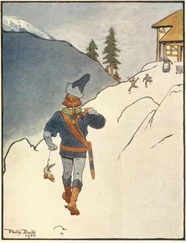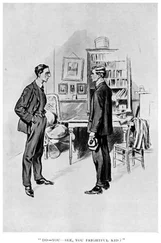Pelham Wodehouse - Homoeopathic Treatment
Здесь есть возможность читать онлайн «Pelham Wodehouse - Homoeopathic Treatment» весь текст электронной книги совершенно бесплатно (целиком полную версию без сокращений). В некоторых случаях можно слушать аудио, скачать через торрент в формате fb2 и присутствует краткое содержание. Жанр: Классическая проза, на английском языке. Описание произведения, (предисловие) а так же отзывы посетителей доступны на портале библиотеки ЛибКат.
- Название:Homoeopathic Treatment
- Автор:
- Жанр:
- Год:неизвестен
- ISBN:нет данных
- Рейтинг книги:5 / 5. Голосов: 1
-
Избранное:Добавить в избранное
- Отзывы:
-
Ваша оценка:
- 100
- 1
- 2
- 3
- 4
- 5
Homoeopathic Treatment: краткое содержание, описание и аннотация
Предлагаем к чтению аннотацию, описание, краткое содержание или предисловие (зависит от того, что написал сам автор книги «Homoeopathic Treatment»). Если вы не нашли необходимую информацию о книге — напишите в комментариях, мы постараемся отыскать её.
Homoeopathic Treatment — читать онлайн бесплатно полную книгу (весь текст) целиком
Ниже представлен текст книги, разбитый по страницам. Система сохранения места последней прочитанной страницы, позволяет с удобством читать онлайн бесплатно книгу «Homoeopathic Treatment», без необходимости каждый раз заново искать на чём Вы остановились. Поставьте закладку, и сможете в любой момент перейти на страницу, на которой закончили чтение.
Интервал:
Закладка:
Homoeopathic Treatment
P. G. Wodehouse
In most of the houses of Wrykyn boys who had been at the school two years, and who were consequently in a sort of transition stage between fags and human beings, shared studies in couples. The fags "pigged" in a body in a common room of their own.
This rule was pleasant enough, provided you got a study-companion of tastes and habits similar to your own. But it often happened that, once in your study, an apparently perfect individual developed some deadly trait, such as a dislike for "brewing" or a taste for aesthetic furniture, and then life on the two-in-a-study system became troubled.
Liss and Buxton shared study eight at Appleby's. For some time all went well. They had much in common with one another. It is true that they were not in the same form, which is what usually cements alliances of this sort, Liss being in the Upper Fourth and Buxton in the Lower Fifth.
But otherwise the understanding seemed perfect. Both did a moderate amount of work, and both were perfectly willing to stop at a moment's notice, in order to play stump cricket or "soccer" in the passage. Liss collected stamps; so did Buxton. Buxton owned a Dr. Giles's crib to the play of "Euripides," which the Upper Fourth were translating that term. Liss replied with a Bohn's "Livy," Book One. "Livy," Book One, was what the Lower Fifth were murdering. In short, all Nature may be said to have been at first one vast substantial smile.
An ideal state of things, but one that was not destined to last.
Liss came back from school one afternoon, entered his study, and threw his books down on the table. Then he sniffed in a startled manner. The first sniff proving unsatisfactory, he encored himself. He was embarking on a third, when Buxton came in. It seemed to Liss that the aroma became stronger on his entry.
"Why, I believe it's you!" he cried.
"What's up now?" asked Buxton.
"Beastly smell somewhere. I was trying to find where it came from."
"Oh, that !" said Buxton, "that's all right. It's only some stuff I've got on my handkerchief. The man at the shop called it Simpkins Idle Moments . Don't you like it?"
Liss flung open the window, and leaned out as far as he could with safety, breathing hard.
"It's not bad when you get used to it," said Buxton. Liss, having fortified himself with a stock of fresh air, wriggled back into the study and directed an indignant glance at his friend.
"It's beastly," he said. "It's the sort of stuff an office-boy out for Bank Holiday uses."
"Oh, no," said Buxton deprecatingly, "think it's rather pleasant myself."
"But what do you want to do it for ?" inquired Liss. "You make me sick."
"Sorry for that. The man I want it to do that to is Day."
Mr. Day was the master of the Lower Fifth.
"The fact is," proceeded Buxton, in the manner of the man who says to the hero of the melodrama, "sit down, and I will tell ye the story of me life," "I've been having rather a row with Day. He shoved me into extra last Wednesday for doing practically nothing. It wasn't my fault that the bit of paper hit him; I was aiming at Smith, and he strolled into the zone of fire just as I shot. I told him I was sorry, too. Well, anyway, he jammed me in extra and yesterday he slanged me about my Latin prose before the whole form, so I thought this was getting a bit too thick, so I thought something had got to be done. So I thought it over a good time, and at last I thought it would be a sound idea if I came into the form-room with some scent on me. Day bars scent awfully, you know."
"So do I," said Liss coldly.
"Calls it clarified fat," continued Buxton, "and that kind of thing, and says using it's a filthy and effete habit only worthy of a degenerate sybarite!"
"So it is," said Liss.
"Well, it acted splendidly. I sat tight, you know, waiting for developments. I could see him getting restive, and peering round the room over his spectacles, and then he spotted me. I don't know how.
"He glared at me for a second; then he said, 'Buxton.'
"'Yes, sir,' I said.
"He beckoned me solemnly and I went up. When I got to his desk he took me by the tip of the ear and examined me.
"'Boy,' he said, 'what- whatis this abomination on your handkerchief?'
"' Simpkins Idle Moments, sir,' I said.
"The chaps yelled.
"'A scent, I presume?'
"'Yes, sir.'
"'And will you kindly inform me, Buxton, for what reason you have adopted this clarified fat?'
"I told him it was for the good of my health. I said doctors recommended it.
"'Boy,' he said, 'your story leaves me sceptical. I do not credit it. Go to your seat. Pah! Throw open the door and all the windows. Buxton, translate from "Ille tamen-" and do not dare to enter this room in such a state to-morrow.'
"I went on to translate, and got ploughed, of course. He gave me the lesson to write out."
"Serve you jolly well right," said Liss.
"I don't think it would be safe," said Buxton, "to try him again with Simpkins after what he said."
"I should think not," said Liss.
"So," continued Buxton triumphantly, "I'm going to appear to-morrow in-(here, regardless of his friend's look of disgust, he drew a small bottle from his pocket and examined the label)-in 'Riggles's Rose of the Hills.' That'll make him sit up. And, curiously enough, doctors say it's very nearly as good for you as Simpkins would be."
When the somewhat searching perfume of Riggles's masterpiece reached Mr. Day on the following morning, he stiffened in his chair.
"Boy!" he shouted. With the natural result that all the form except Buxton looked up. Buxton was apparently too busy with his work to spare a moment.
"Come here , Buxton," added Mr. Day.
Buxton advanced to the desk with the firm step that tells of an easy conscience.
"In spite of what I said to you yesterday, you have The Audacity," began Mr. Day, speaking in capitals, "to Come Here Again in this [Image] DISGUSTING State." .submit()
"Si-i-r!!" interjected Buxton, moaning with righteous indignation.
"Well, boy?"
"I don't see what I've done, sir." [Image] ьXdЂ "You-Don't-See-What-You've-Done? Did I not tell you yesterday that I would not have you enter my form-room with Simpkins/-er-I forget the precise name of that abomination-on your handkerchief?"
"Oh, but, sir," said Buxton, in the pleased tone of one who sees exactly where he and a bosom friend have misunderstood one another, and sees also his way to put matters right, "This isn't Simpkins Idle Moments . It's 'Riggles's Rose of the Hills.'"
Mr. Day raved. What did it matter whether the abomination he affected were manufactured by Riggles, or Diggles, or Biggles, or Robinson? WHAT did it matter what name its degraded patentee had applied to it? The point was that it was scent, and-he-would-not- have/-scent in his form-room. So-kindly-remember-that-once-and-for-all-and-go-to- your-seat-and-don't-let-me-have-to-speak-to-you-again.
Buxton protested. Was he a slave? That was what Buxton would like to know. He was sure that there was no school rule against the use of scent as a precaution against germs. He didn't want germs. He was certain that his mother would not like it if he had germs. It was a shame that you were sent to schools where you were made to have germs.
The situation was at a deadlock. Much as he disliked scent, Mr. Day was obliged to admit to himself that the law was not on his side. He was a serious man without a spark of humour in his composition, and with a tremendous enthusiasm for fairness, and he did not wish to do anything tyrannical. If the boy really was afraid of germs, he had no right to prevent him doing his best to stave them off.
He gave up the struggle in despair. Buxton walked back to his seat, and two days later entered the form-room with a cold which not only made it necessary for him to use eucalyptus, but also to speak unintelligibly through his nose. Mr. Day spent the morning with his handkerchief to his face, a pathetic figure which would have softened the heart of a less vengeful person than Buxton.
Читать дальшеИнтервал:
Закладка:
Похожие книги на «Homoeopathic Treatment»
Представляем Вашему вниманию похожие книги на «Homoeopathic Treatment» списком для выбора. Мы отобрали схожую по названию и смыслу литературу в надежде предоставить читателям больше вариантов отыскать новые, интересные, ещё непрочитанные произведения.
Обсуждение, отзывы о книге «Homoeopathic Treatment» и просто собственные мнения читателей. Оставьте ваши комментарии, напишите, что Вы думаете о произведении, его смысле или главных героях. Укажите что конкретно понравилось, а что нет, и почему Вы так считаете.


